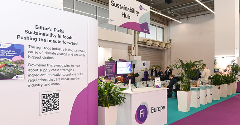News
Report: RTE cereals in decline
20 Apr 2016Ready-to-eat (RTE) breakfast cereals are seeing a continued and accelerating decline in sales, indicating a secular downtrend rather than a mere blip, as consumer eating habits continue to evolve, according to Lux Research.

Ready-to-eat (RTE) breakfast cereals are seeing a continued and accelerating decline in sales, indicating a secular downtrend rather than a mere blip, as consumer eating habits continue to evolve, according to Lux Research.
The rate of growth of cereals began to slide in 2007, and the market has been shrinking overall since a 2011 peak of $8.5 billion, as a younger population embraces other alternatives, the company said. In 2014, when sales of breakfast cereals dropped for the fourth year in a row, yogurt sales exceeded $7 billion and snack bars topped $5.5 billion, revealing a generational shift."The need for greater convenience, changing social mores, and an increasingly mobile workforce are changing the definition of breakfast," said Joice Pranata, Lux Research Associate and lead author of the report titled, "Cereal Loses Crunch as Breakfast Alternatives Take Over”. “With the drive toward 'natural' and 'healthy' choices, there's also greater opportunity for experimentation with new breakfast alternatives.”Lux Research analysts studied emerging breakfast alternatives as cereals continue their steady decline. Among their findings:+ Demographic shifts causing market upheaval. Fundamental demographic shifts are part of changes in consumer choices. Declining birth rates and later marriages in western economies have eroded the base of the population pyramid. However, half of the consumers in the 2-11 age group have shifted away from traditional breakfast cereals. + Over 7,000 snack bars in market. The sheer number snack bars on the market reflects the scale of the competition traditional cereal makers face. Cereal bars, fruit bars, granola or muesli bars, and energy and nutrition bars offer numerous choices to consumers. Sales of these bars have more than tripled from $1.8 billion in 2003 to over $5.5 billion in 2014. + Yogurt sales are spurred by health concerns. Yogurt consumption in the U.S. has soared over the past decade, rising at an average of 6.1% annually from 2004 to 2015. Yogurt's rise is driven by the nutritional platform it offers - as a source of protein and as a probiotic, with the ability to deliver other health functionalities such as vitamin K2 and omega-3 fatty acids.Related news

The winners of Vitafoods Europe Startup Challenge 2025 revealed
29 May 2025
Four startups – Yomio Drops, PFx Biotech, Revobiom, and Favamole – took top prizes at this year’s Vitafoods Europe Startup Challenge awards.
Read more
East takes on West in the fight for future food flavours
30 Apr 2025
Asian and South American flavours are now key components on global menus, driven by a growing global appetite for culinary mashups.
Read more
Food companies urged to bring ‘joy’ and urgency to healthy food mission
14 Mar 2025
For too long, businesses have treated health and sustainability as separate agendas – but there is growing evidence to show diets that benefit human health can also enhance that of the planet, say experts.
Read more
Entries open for inaugural Vitafoods Europe Innovation Awards
29 Jan 2025
Entries are open for the inaugural Vitafoods Europe Innovation Awards, celebrating the ingredients, finished products, partnerships, and initiatives redefining the nutraceutical landscape.
Read more
Paris Olympics: Food and beverage brands champion health, fun, and sustainability
5 Aug 2024
Food and beverage brands are aligning with the Paris Olympics 2024 Food Vision, which emphasises sustainability, local sourcing, and plant-based diets.
Read more
Natural Remedies: Bringing health and happiness via validated branded ingredients
18 Apr 2024
Natural Remedies is an internationally renowned botanical healthcare company committed to advancing the field through rigorous research and the development of clinically validated Branded Ingredients. Guided by our foundational principle of ‘BEING USEF...
Read more
Exploring the future of health and wellness retail at Vitafoods Europe
14 Mar 2024
With retail-focussed content sessions, buyer networking, and finished product tasting sessions, this year’s Vitafoods Europe offers a not-to-be-missed opportunity for retailers to up their health and wellness game.
Read more
Sustainability meets innovation at Fi Europe 2023's Sustainability Ingredients Zone
9 Jan 2024
Fi Europe’s Sustainable Ingredients Zone showcases ingredients forging a path toward a greener future. Three innovators are redefining what sustainability within the food and beverage industry means, with upcycled products, regenerative agriculture, an...
Read more
Unleashing the power of plants at Fi Europe’s New Product Zone
5 Jan 2024
In the diverse landscape of plant-based innovation, Fi Europe 2023's New Product Zone spotlighted ten plant-based ingredients, tailored to meet the rising demand for sustainable and delicious options.
Read more
Meet the innovative ingredients showcased at Fi Europe’s New Product Zone
3 Jan 2024
The Food Ingredients category at Fi Europe’s New Product Zone featured 19 distinct and innovative products. From fermented delights to sustainable proteins, these ingredients are ready to make their mark in the market.
Read more